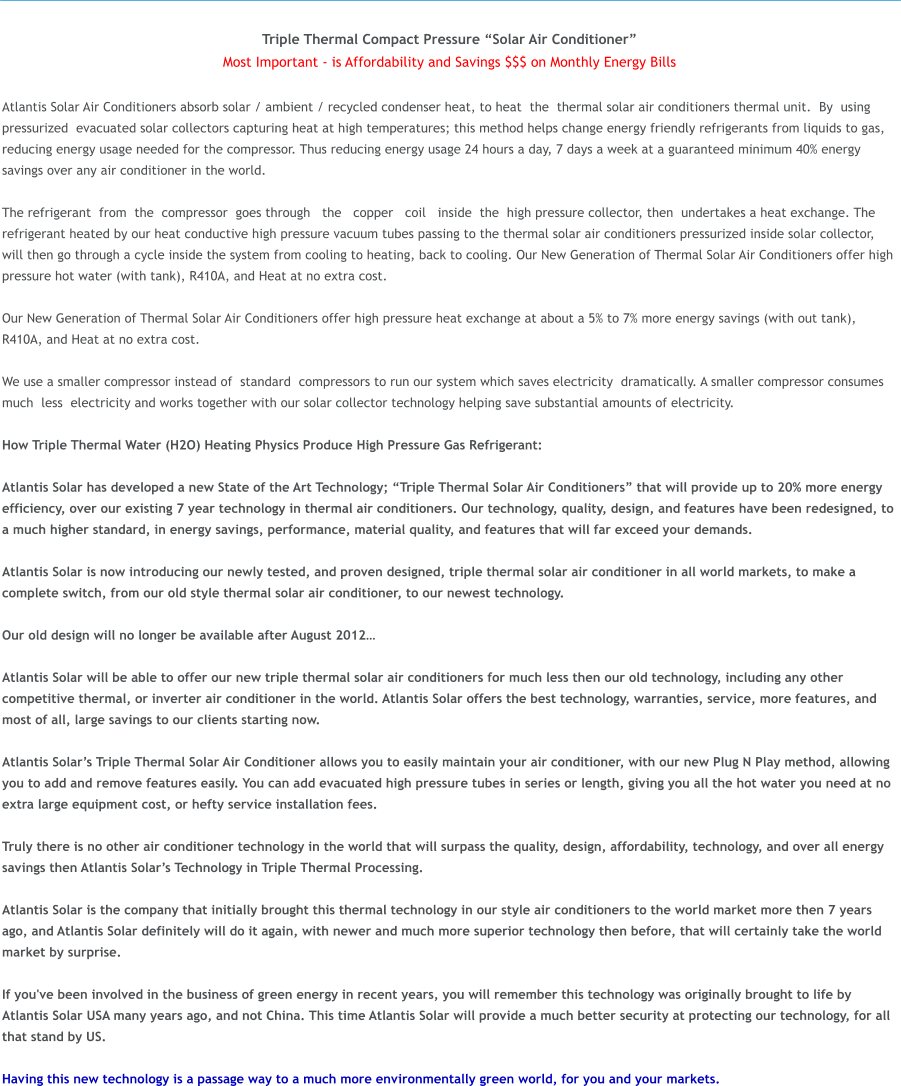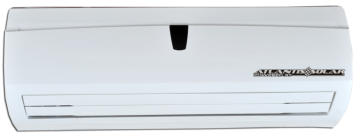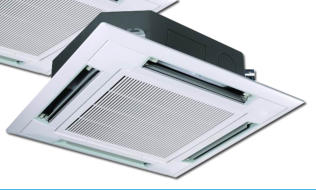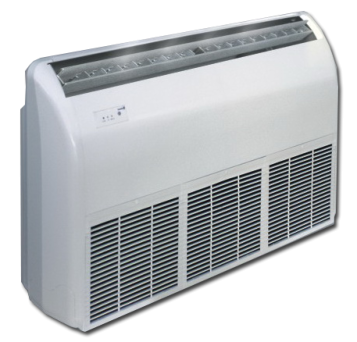


Atlantis Solar






Tel: 916-226-9183 | Save Paper Use PDF: | Email: sales@atlantissolar.com
®
Every one is plugging in! “Go Green”
®


●●●2 Patents●●●
"IMPORTANT" Understanding how to Measure Energy Used / Saved
(BTU / Energy Used / EER / COP)...Read Here...
Atlantis Solar Triple Thermal Compact Pressure Plug-n-Play
Solar Air Conditioner
Now Offering Free Hot Water
"Including Optional Pure Drinking Water and UV Technology"
UV Technology (Ultraviolet H2O and O2 Bacteria Killing Technology)
*** Now Better then Ever ***
Up to a 5 Year Warranty, with Many Extra plug and play options, at no Extra Cost
● Solar Air conditioners with Triple Thermal Processing
● Free High Pressure Hot Water
● Tank less High Pressure Evacuated Waterless Solar Air Conditioners for those
who do not want water
● UV Technology to kill off harmful viruses and germs causing illness
● 5 Year Warranty on our Atlantis Solar Thermal Tank
● 2 Year Warranty on our high quality compressor
● 1 Year Standard Warranty on all Mechanical Parts
● Distributor can offer Extended Warranties
UV Technology is the future of having a very good healthy atmosphere in side
your home or business, greatly reducing chances of illness (Ask for Details)
Guaranteed Better COP - EER - Faster Cooler Air Over any Air Conditioner in the World
Atlantis Solar Air Conditioners will prove to the World, that our Newest Technology will Guarantee The Below Results:
■ Outlast any other Air Conditioner of our BTU Size,,, In Quality, Life, and Energy Savings
■ Higher COP = Longer Life, Lower Energy Usage
■ Higher EER = Longer Life, Lower Energy Usage
■ 100% Faster Cooling Rate With Dual Condensers, Larger Evaporators = Longer Compressor Life, With Little to No Down Time, Lower Energy Usage,
and Best of All "Large Over All Savings"
■ Longer Life over any Air Conditioner, with our Triple Thermal Assist Technology, Material Quality, and High Standard QC
■ 100% Environmentally, and User Friendly
■ Lower Operational Time to Achieve Inside Comfort Levels Much Faster, Saving Energy Usage, By Increasing The Life Span of our Atlantis Solar Air
Conditioners
■ Designed to Operate in Most of the Warmest Environments in the World, with out Failure
■ Atlantis Solar Air Conditioners are designed a Plug -N- Play Technology, Making it Easy to Add Accessories, with out Making Costly Changes, Add
Extra Hot Water Storage Tanks, More or Longer Evacuated Solar Tubes, Connect Atlantis Solar Air Conditioners Together, and Much More.
■ A Very Nice Feature Atlantis Solar Air Conditioners Offer - Is Free Hot Water, and Continuously Updated Technology at "NO Extra Cost"
New Atlantis Solar Triple Thermal Solar Air Conditioner Models

SK-9000W Atlantis Solar Triple Thermal Solar Air Conditioner 9000Btu
- SK-1W Atlantis Solar Triple Thermal Solar Air Conditioner 12000Btu
- SK-1.8W Atlantis Solar Triple Thermal Solar Air Conditioner 18000Btu
- SK-2W Atlantis Solar Triple Thermal Solar Air Conditioner 24000Btu
- SK-2.5W Atlantis Solar Triple Thermal Solar Air Conditioner 30,000Btu
- SK-9000W x 2 Atlantis Solar Triple Thermal Solar Air Conditioner
9000Btu + 9000Btu
- SK-9000W + 12000Btu Atlantis Solar Triple Thermal Solar Air
Conditioner 9000Btu + 12000Btu
- SK-1W + 1W Atlantis Solar Triple Thermal Solar Air Conditioner
12000Btu + 12000Btu

- SK-1.8F Atlantis Solar Triple Thermal Solar Air Conditioner 18,000Btu
- SK-2F Atlantis Solar Triple Thermal Solar Air Conditioner 24,000Btu
- SK-3.2 Atlantis Solar Triple Thermal Solar Air Conditioner 36000Btu
- SK-3.5F Atlantis Solar Triple Thermal Solar Air Conditioner 42,000Btu
- SK-4F Atlantis Solar Triple Thermal Solar Air Conditioner 48,000Btu

- SK-1D Atlantis Solar Triple Thermal Solar Air Conditioner 12000Btu
- SK-1.8D Atlantis Solar Triple Thermal Solar Air Conditioner 18000Btu
- SK-2D Atlantis Solar Triple Thermal Solar Air Conditioner 24000Btu
- SK-2.5D Atlantis Solar Triple Thermal Solar Air Conditioner 30,000Btu
- SK-3D Atlantis Solar Triple Thermal Solar Air Conditioner 36,000Btu
- SK-4D Atlantis Solar Triple Thermal Solar Air Conditioner 48,000Btu
- SK-6D Atlantis Solar Triple Thermal Solar Air Conditioner 71,000Btu

- S- SK-1.8C Atlantis Solar Triple Thermal Solar Air Conditioner 18000Btu
- SK-2C Atlantis Solar Triple Thermal Solar Air Conditioner 24000Btu
- SK-3.5C Atlantis Solar Triple Thermal Solar Air Conditioner 41000Btu

- SK-1.8C x 2 Atlantis Solar Triple Thermal Solar Air Conditioner 18000Btu +
18000Btu
- SK-1.8C + 2C Atlantis Solar Triple Thermal Solar Air Conditioner 18000Btu +
24000Btu
- SK-2C x 2 Atlantis Solar Triple Thermal Solar Air Conditioner 24000Btu +
24000Btu





Boiling points to vapor:
The boiling point of a substance is the temperature at which the vapor pressure of the liquid equals the pressure surrounding the liquid and the
liquid changes into a vapor.
A liquid in a vacuum has a lower boiling point than when that liquid is at atmospheric pressure. A liquid at high-pressure has a higher boiling
point than when that liquid is at atmospheric pressure. In other words, the boiling point of a liquid varies depending upon the surrounding
environmental pressure. For a given pressure, different liquids boil at different temperatures.
The normal boiling point (also called the atmospheric boiling point or the atmospheric pressure boiling point) of a liquid is the special case in
which the vapor pressure of the liquid equals the defined atmospheric pressure at sea level, 1 atmosphere. At that temperature, the vapor
pressure of the liquid becomes sufficient to overcome atmospheric pressure and allow bubbles of vapor to form inside the bulk of the liquid.
The standard boiling point is now (as of 1982) defined by IUPAC as the temperature at which boiling occurs under a pressure of 1 bar. The heat
of vaporization is the amount of energy required to convert or vaporize a saturated liquid (i.e., a liquid at its boiling point) into a vapor.
Liquids may change to a vapor at temperatures below their boiling points through the process of evaporation. Evaporation is a surface
phenomenon in which molecules located near the liquid's edge, not contained by enough liquid pressure on that side, escape into the
surroundings as vapor. On the other hand, boiling is a process in which molecules anywhere in the liquid escape, resulting in the formation of
vapor bubbles within the liquid.
Contents:
1 Saturation temperature and pressure
2 Relation between the normal boiling point and the vapor pressure of liquids
3 Properties of the elements
4 Boiling point as a reference property of a pure compound
5 Impurities and mixtures
6 See also
7 References
Saturation temperature and pressure:
A saturated liquid contains as much thermal energy as it can without boiling (or conversely a saturated vapor contains as little thermal energy
as it can without condensing).
Saturation temperature means boiling point. The saturation temperature is the temperature for a corresponding saturation pressure at which a
liquid boils into its vapor phase. The liquid can be said to be saturated with thermal energy. Any addition of thermal energy results in a phase
transition.
If the pressure in a system remains constant (isobaric), a vapor at saturation temperature will begin to condense into its liquid phase as thermal
energy (heat) is removed. Similarly, a liquid at saturation temperature and pressure will boil into its vapor phase as additional thermal energy is
applied.
The boiling point corresponds to the temperature at which the vapor pressure of the liquid equals the surrounding environmental pressure.
Thus, the boiling point is dependent on the pressure. Usually, boiling points are published with respect to atmospheric pressure (101.325
kilopascals or 1 atm). At higher elevations, where the atmospheric pressure is much lower, the boiling point is also lower. The boiling point
increases with increased pressure up to the critical point, where the gas and liquid properties become identical. The boiling point cannot be
increased beyond the critical point. Likewise, the boiling point decreases with decreasing pressure until the triple point is reached. The boiling
point cannot be reduced below the "Triple Point".
If the heat of vaporization and the vapor pressure of a liquid at a certain temperature is known, the normal boiling point can be calculated by
using the Clausius-Clapeyron equation thus:
= the normal boiling point, K
= the ideal gas constant, 8.314 J · K−1 · mol−1
= is the vapor pressure at a given temperature, atm
= the heat of vaporization of the liquid, J/mol
= the given temperature, K
= the natural logarithm to the base
Saturation pressure is the pressure for a corresponding saturation temperature at which a liquid boils into its vapor phase. Saturation pressure
and saturation temperature have a direct relationship: as saturation pressure is increased so is saturation temperature.
If the temperature in a system remains constant (an isothermal system), vapor at saturation pressure and temperature will begin to condense
into its liquid phase as the system pressure is increased. Similarly, a liquid at saturation pressure and temperature will tend to flash into its
vapor phase as system pressure is decreased.
The boiling point of water is 100 °C (212 °F) at standard pressure. On top of Mount Everest, at 8,848 m (29,029 ft) elevation, the pressure is
about 252 mbar (25.200 kPa) and the boiling point of water is 63 °C (145.4 °F). The boiling point decreases 1 °C every 285 m of elevation, or
1 °F every 500 ft.
For purists, the normal boiling point of water is 99.97 degrees Celsius at a pressure of 1 atm (i.e., 101.325 kPa). Until 1982 this was also the
standard boiling point of water, but the IUPAC now recommends a standard pressure of 1 bar (100 kPa). At this slightly reduced pressure, the
standard boiling point of water is 99.61 degrees Celsius. Relation between the normal boiling point and the vapor pressure of liquids
A typical vapor pressure chart for various liquids The higher the vapor pressure of a liquid at a given temperature, the lower the normal boiling
point (i.e., the boiling point at atmospheric pressure) of the liquid.
The vapor pressure chart to the right has graphs of the vapor pressures versus temperatures for a variety of liquids. As can be seen in the
chart, the liquids with the highest vapor pressures have the lowest normal boiling points.
For example, at any given temperature, methyl chloride has the highest vapor pressure of any of the liquids in the chart. It also has the lowest
normal boiling point (-24.2 °C), which is where the vapor pressure curve of methyl chloride (the blue line) intersects the horizontal pressure
line of one atmosphere (atm) of absolute vapor pressure.
Properties of the elements:
Further information: List of elements by boiling point The element with the lowest boiling point is helium. Both the boiling points of rhenium
and tungsten exceed 5000 K at standard pressure; because it is difficult to measure extreme temperatures precisely without bias, both have
been cited in the literature as having the higher boiling point. Boiling point as a reference property of a pure compound
As can be seen from the above plot of the logarithm of the vapor pressure vs. the temperature for any given pure chemical compound, its
normal boiling point can serve as an indication of that compound's overall volatility. A given pure compound has only one normal boiling point,
if any, and a compound's normal boiling point and melting point can serve as characteristic physical properties for that compound, listed in
reference books. The higher a compound's normal boiling point, the less volatile that compound is overall, and conversely, the lower a
compound's normal boiling point, the more volatile that compound is overall. Some compounds decompose at higher temperatures before
reaching their normal boiling point, or sometimes even their melting point. For a stable compound, the boiling point ranges from its Triple Point
to its critical point, depending on the external pressure. Beyond its triple point, a compound's normal boiling point, if any, is higher than its
melting point. Beyond the critical point, a compound's liquid and vapor phases merge into one phase, which may be called a superheated gas.
At any given temperature, if a compound's normal boiling point is lower, then that compound will generally exist as a gas at atmospheric
external pressure. If the compound's normal boiling point is higher, then that compound can exist as a liquid or solid at that given temperature
at atmospheric external pressure, and will so exist in equilibrium with its vapor (if volatile) if its vapors are contained. If a compound's vapors
are not contained, then some volatile compounds can eventually evaporate away in spite of their higher boiling points.
In general, compounds with ionic bonds have high normal boiling points, if they do not not decompose before reaching such high temperatures.
Many metals have high boiling points, but not all. Very generally—with other factors being equal—in compounds with covalently bonded
molecules, as the size of the molecule (or molecular mass) increases, the normal boiling point increases. When the molecular size becomes
that of a macromolecule, polymer, or otherwise very large, the compound often decomposes at high temperature before the boiling point is
reached. Another factor that affects the normal boiling point of a compound is the polarity of its molecules. As the polarity of a compound's
molecules increases, its normal boiling point increases, other factors being equal. Closely related is the ability of a molecule to form hydrogen
bonds (in the liquid state), which makes it harder for molecules to leave the liquid state and thus increases the normal boiling point of the
compound. Simple carboxylic acids dimerize by forming hydrogen bonds between molecules. A minor factor affecting boiling points is the shape
of a molecule. Making the shape of a molecule more compact tends to lower the normal boiling point slightly compared to an equivalent
molecule with more surface area.
Binary boiling point diagram of two hypothetical only weakly interacting components without an azeotrope Most volatile compounds (anywhere
near ambient temperatures) go through an intermediate liquid phase while warming up from a solid phase to eventually transform to a vapor
phase. By comparison to boiling, a sublimation is a physical transformation in which a solid turns directly into vapor, which happens in a few
select cases such as with carbon dioxide at atmospheric pressure. For such compounds, a sublimation point is a temperature at which a solid
turning directly into vapor has a vapor pressure equal to the external - pressure.
Introduction:
Our products are becoming very popular throughout the world today
and Atlantis Solar products will be in over 50 countries by the end of
this year 2008.
Our solar air conditioners are the most popular air conditioners in the
world, being the only patented real thermal solar air conditioners today
that actually are guaranteed to save 30% to 40% and more on energy
usage 24/7.
Atlantis Solar air conditioner offers the best quality and performance in
the world built with all inner and outer steel, structure and
components. Operating flow and heat / cold processing control copper
tubing helps convert and send thermal heated GREEN gasses to the solar
air conditioners Hitachi and Panasonic compressors. With our thermal
solar processing helping heat the medium reducing the compressor
workload, therefore saving energy usage and providing a comfortable
atmosphere.
Atlantis Solar air conditioners offers a guaranteed starting 40% more
energy efficiency 365 days per year, the hotter it gets outside, the
more energy efficient our solar air conditioners are on saving energy.
Atlantis Solar inside blower units offers a dual and triple evaporation
processing sending much colder air to the inside of your home or
business much faster then any air conditioner in the world.
POWERFUL DEHUMIDIFICATION
In order to fit the wet season, specially designed dehumidification
function can remove 1.5kg water per hour (with no temperature
lowering basically). Thus averts the uncomforted caused by cooling and
dehumidifying simultaneously.
Intelligent defrosting, and cold resistance technology
In cold seasons or continuous air conditioning operation, the outdoor
condenser forms a thick layer of cream on the condenser resulting in
lower performance air-conditioning. A solar-functional air-conditioning
intelligent defrost solution resolving this problem, always giving you the
best performance.
GREEN ENVIRONMENTAL PROTECTION
Our air-conditioner provide with three levels of protecting system, i.e.
dust filtering net with inside vacuum, electrostatic fiber and active
carbon absorbing layer. They can remove peculiar smell, disinfect air
and filter harmful material. Thus keeps the air fresh, and avoids the air-
conditioner disease. During appraising, it has been found that in the
room after half an hour running, 80% dust had been reduced and 95%
bacteria have been killed.
Our inside fan blower unit offers a self cleaning vacuum system that
helps reduce dust and bacteria particles, immediately sending partials
from the inside of your home or office to the outside. This provides a
cleaner bacteria and dust free atmosphere during operation, giving you
a much healthier lifestyle inside.
Atlantis Solar® air-conditioner's are designed according to the Carnot
Cycle theory, combined with solar and heat pump technology, a Saving
Energy & Green Product. Our systems are Hybrid Solar Systems. Our
solar air-conditioners can produce cooling and heating all in one.
Atlantis Solar air conditioner systems will produce needed hot-water for
other in home or business uses in the future, as it is a multifunction
machine.
Atlantis Solar air-conditioner's collect solar heat energy with its
collector, the collected heat energy will be reasonably distributed in
reducing energy usage in our solar air-conditioners. This provides lower
power consumption and helps save cost.
Superior frequency with inverter air conditioning technology in our
indoor units using temperature to set it off, giving the end user
continued daily energy savings.
Our solar air-conditioning technology according to the actual social
situation, introduce a more cost-effective solution to air-conditioning,
affordable, energy-efficiency far more then regular air-conditioning
units.
Atlantis Solar air-conditioning heat exchangers, as the core components
with in our solar technology of our air-conditioning units use heat
exchange which is effective in the V-shaped, flat-plate heat exchangers
increased by 20% -40% , with the refrigeration system then improving
the thermal effect and providing energy savings.
COMPACT DESIGN
With the same power consumption, our air-conditioner outputs larger
volume of cool/heat air.
EFFICIENT AND QUIET
Large-diameter turbofan and vortex duct are incorporated for powerful
and quiet airflow. The design of scroll-compressor leads to lower noise
and higher efficiency.
Atlantis Solar air conditioner running Principle
A year of use with our thermal solar energy-solar air-conditioning
units, offering dual-energy, solar energy as auxiliary power,
according to non-physical principle of complementarily to the
photoelectric effect.
Combination of the traditional home air conditioning technology
transfer, absorption and use a combination of thermal siphon and
smaller compressor compression, providing environmentally
friendly Energy-efficient refrigerants as refrigeration and heating
for environmental protection and energy conservation purposes.
Why solar power-saving air-conditioning…
First, it uses a majority of thermal solar energy turning liquid in to
gas, Secondly, it adopts to a highly efficient heat transfer system.
Solar collectors / heat absorbers collect a certain amount of solar
energy for air conditioning to work as a energy supplement
offering an effective distribution system and greatly reducing
Compressor Energy loss; intelligent controlling of the Atlantis solar
air-conditioning system can automatically guarantee solar
collection as part of the normal energy supply.
Secondly, the use of a thread, hydrophilic aluminum foil, for the
heat transfer system optimization match, reducing energy loss
improving overall efficiency and effectively guaranteed results.
Therefore, solar air-conditioning is much more convenient than
regular air-conditioning saving you allot of energy usage.
How heat provides energy and air conditioning. Read more:
Operating at night and when cloudy
Location
Installation of Atlantis Solar air-conditioners is the most important
step from us the manufacturer to our end-user. The result of
installation will decide overall performance, including life and use
of the solar air-conditioner.
Our Atlantis Solar air conditioner units collects solar heat energy
by a thermal siphon solar collector. These solar air-conditioners
also can operate with efficiency at night or on cloudy days.
Atlantis Solar air conditioner units use a thermal storing energy
tank like a thermos in the solar collector to help store solar heat
energy.
Installation:
Our Solar air conditioner units are similar to traditional air-
conditioners.
Solar collector helps provide more efficiency to the solar air
conditioner when placed in the sun.
Shorter piping connected to the solar collector from the outdoor
and indoor unit, for better cooling results.
To be installed by a professional.
Installed according to the requirements of the installation manual.
Install in a location for a nice appearance.
Split Wall:
SK-W Series
AUTOMATICALLY CONTROL HORIZONTAL VANE
In order to reach set temperature rapidly, when AUTO mode is
selected, the position of horizontal vane is automatically set to
correspond to the operation mode to perform effective operation.
FLOOR STANDING SERIES
MODEL NUMBER: SK-2F, SK-3F, SK-5F
LONG DISTANCE AND WIDE-ANGLE AIRFLOW
The grille of our cabinet air-conditioner adopts specially designed
blades. Powerful airflow distribute cool or heat air to each corner
of the room in a short time.
AUXILIARY ELECTRIC HEATING FUNCTION
Auxiliary electric heating system is adopted to ensure sufficient
air-conditioning even in chilly winter.





Every one is plugging in ! ®
Copyright 2003-2017 © Atlantis Solar®, All rights reserved.










- SK-1CF Atlantis Solar Triple Thermal Solar Air Conditioner 12000Btu
- SK-1.8CF Atlantis Solar Triple Thermal Solar Air Conditioner 18000Btu
- SK-2CF Atlantis Solar Triple Thermal Solar Air Conditioner 24000000Btu
- SK-2.8CF Atlantis Solar Triple Thermal Solar Air Conditioner 34000Btu
- SK-3.5CF Atlantis Solar Triple Thermal Solar Air Conditioner 42000Btu
- SK-4CF Atlantis Solar Triple Thermal Solar Air Conditioner 48000Btu


No air conditioner compares to Atlantis Solar over all annual energy savings

































